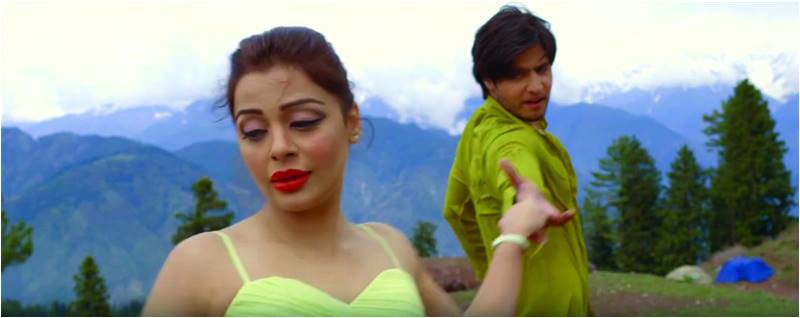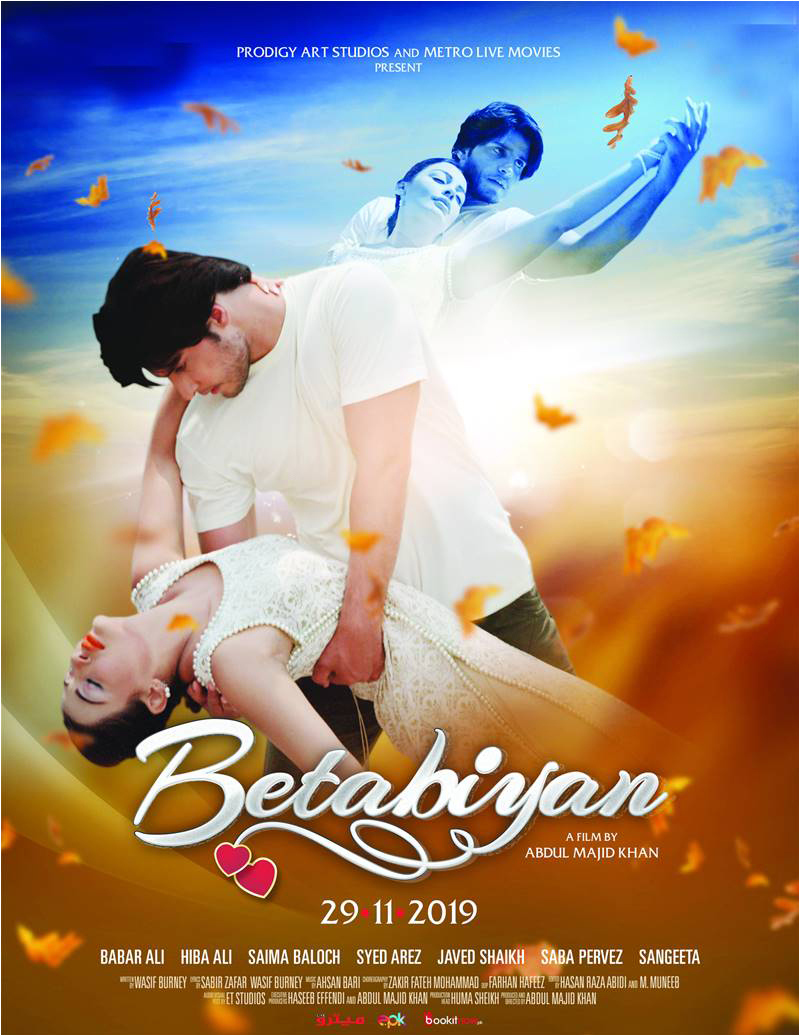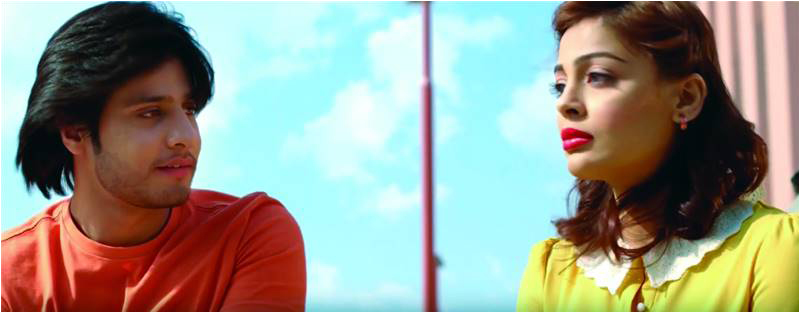
If you look at the pattern that this column has formed over the past couple of years, especially this year in the aftermath of the now almost year-old Bollywood ban, you would notice that after every half-decent effort comes a barrage of mediocrity from our neck of the woods.
Unlike films from Hollywood, or Bollywood when they were still being released in the country, our critique of Lollywood has unapologetic partisanship. It’s our film industry and we want it to grow more so than the rest. In fact, throughout the soon to culminate decade we’ve been forcibly given the responsibility of being the cheerleaders of a revival that never was or has been – but one hopes will eventually be.

In this vicious circle of one step forward and ten back, we will once again take you on the path more frequently taken, regrettably. And in this particular case, the regression isn’t just in the quality of work or the screenwriting, the film manages to take you back in time to offer you the worst of the decades, nay century, gone by.
Betabiyan is a mélange of the lowest points offered by Pakistani films of 1990s and Indian serials from the early 2000s. To further rub the 90s in your face, the film also stars Babar Ali, who actually turns out to be one of the few bearable features of Betabiyan.
In fact, truth be told, while Babar Ali is no stranger to the bizarre-fest that Lollywood of the 90s was, here he actually reaffirms that he can still perform at this stage of his career. But if the filmmakers choose to rope him in for hopeless causes, the best he can do is do his bits well – which, in this particular case, he absolutely does.
With the most simplistic of storylines, the Betabiyan fails on pretty much every front, and creates new ones to do so, on its way to self-implosion. Barring the seasoned actors, many of whom only have limited cameos, the acting is disastrous.
Similarly, the editing is done haphazardly with absolutely no intention to give the film any shape, let alone one that is sharp and concise. The writing is not just outdated, it musters the weakest bits from the weakest era of the film industry. And everything else from the makeup to the wardrobe, to cinematography to even basic camerawork, is completely out of sync.
Hassan (Babar Ali) loses his wife during the birth of their daughter Nida (Saima Balochi). After the death of Nida’s mother, Hassan decides to raise her on his own with the help of his friend Niggi (Hiba Ali). Hiba, surprise surprise, secretly loves Hassan and hence decides to devote her entire life to the father and daughter – and yet, this doesn’t quite suffice in conveying to the man that this was a woman in love with him.

Nida grows older and falls in love with Zain (Syed Arez), in turn forming the second of the two love stories, from two different generations, which run parallel to one another. Veterans Saba Hameed and Javed Sheikh have guest appearances at best in the movie as Zain’s parents.
For Babar Ali’s fans the film might provide some amount of joy. He maintains his on screen presence in the new age bracket that he’s playing, while recreating his best from the 90s. What also makes him stand out are the performances of the other three leading actors.
If you had to pick one, Hiba Ali arguably is the better among the trio, despite the filmmakers’ best efforts to make her up as a melodramatic leading lady from your stereotypical “family dramas” from across the border. Among Saima Baloch and Syed Arez it is the latter who stands out as the least capable actor.
The music isn’t quite up to the mark either, even though the songs – sometimes squeezed in together almost back to back – might provide some relief from the below par filmmaking skills on display elsewhere. With big names like Shafqat Amanat Ali Khan, Humera Channa, Rahat Fateh Ali Khan and Javed Bashir, one would’ve expected a better soundtrack.
Abdul Majid Khan’s directorial debut appears to have been envisioned at the start of the 1990s only to be released on the brink of 2020s. If you feel forcing yourself to watch such films will help ‘revive’ Lollywood, donating the ticket price to a ‘film fund’ would be a better idea – only if there’s a guarantee that money could reach a talented and hardworking filmmaker with a know-how of the basic skills in the profession.
Unlike films from Hollywood, or Bollywood when they were still being released in the country, our critique of Lollywood has unapologetic partisanship. It’s our film industry and we want it to grow more so than the rest. In fact, throughout the soon to culminate decade we’ve been forcibly given the responsibility of being the cheerleaders of a revival that never was or has been – but one hopes will eventually be.

In this vicious circle of one step forward and ten back, we will once again take you on the path more frequently taken, regrettably. And in this particular case, the regression isn’t just in the quality of work or the screenwriting, the film manages to take you back in time to offer you the worst of the decades, nay century, gone by.
Betabiyan is a mélange of the lowest points offered by Pakistani films of 1990s and Indian serials from the early 2000s. To further rub the 90s in your face, the film also stars Babar Ali, who actually turns out to be one of the few bearable features of Betabiyan.
In fact, truth be told, while Babar Ali is no stranger to the bizarre-fest that Lollywood of the 90s was, here he actually reaffirms that he can still perform at this stage of his career. But if the filmmakers choose to rope him in for hopeless causes, the best he can do is do his bits well – which, in this particular case, he absolutely does.
If you had to pick one, Hiba Ali arguably is the better among the trio, despite the filmmakers’ best efforts to make her up as a melodramatic leading lady from your stereotypical “family dramas” from across the border
With the most simplistic of storylines, the Betabiyan fails on pretty much every front, and creates new ones to do so, on its way to self-implosion. Barring the seasoned actors, many of whom only have limited cameos, the acting is disastrous.
Similarly, the editing is done haphazardly with absolutely no intention to give the film any shape, let alone one that is sharp and concise. The writing is not just outdated, it musters the weakest bits from the weakest era of the film industry. And everything else from the makeup to the wardrobe, to cinematography to even basic camerawork, is completely out of sync.
Hassan (Babar Ali) loses his wife during the birth of their daughter Nida (Saima Balochi). After the death of Nida’s mother, Hassan decides to raise her on his own with the help of his friend Niggi (Hiba Ali). Hiba, surprise surprise, secretly loves Hassan and hence decides to devote her entire life to the father and daughter – and yet, this doesn’t quite suffice in conveying to the man that this was a woman in love with him.

Nida grows older and falls in love with Zain (Syed Arez), in turn forming the second of the two love stories, from two different generations, which run parallel to one another. Veterans Saba Hameed and Javed Sheikh have guest appearances at best in the movie as Zain’s parents.
For Babar Ali’s fans the film might provide some amount of joy. He maintains his on screen presence in the new age bracket that he’s playing, while recreating his best from the 90s. What also makes him stand out are the performances of the other three leading actors.
If you had to pick one, Hiba Ali arguably is the better among the trio, despite the filmmakers’ best efforts to make her up as a melodramatic leading lady from your stereotypical “family dramas” from across the border. Among Saima Baloch and Syed Arez it is the latter who stands out as the least capable actor.
The music isn’t quite up to the mark either, even though the songs – sometimes squeezed in together almost back to back – might provide some relief from the below par filmmaking skills on display elsewhere. With big names like Shafqat Amanat Ali Khan, Humera Channa, Rahat Fateh Ali Khan and Javed Bashir, one would’ve expected a better soundtrack.
Abdul Majid Khan’s directorial debut appears to have been envisioned at the start of the 1990s only to be released on the brink of 2020s. If you feel forcing yourself to watch such films will help ‘revive’ Lollywood, donating the ticket price to a ‘film fund’ would be a better idea – only if there’s a guarantee that money could reach a talented and hardworking filmmaker with a know-how of the basic skills in the profession.

